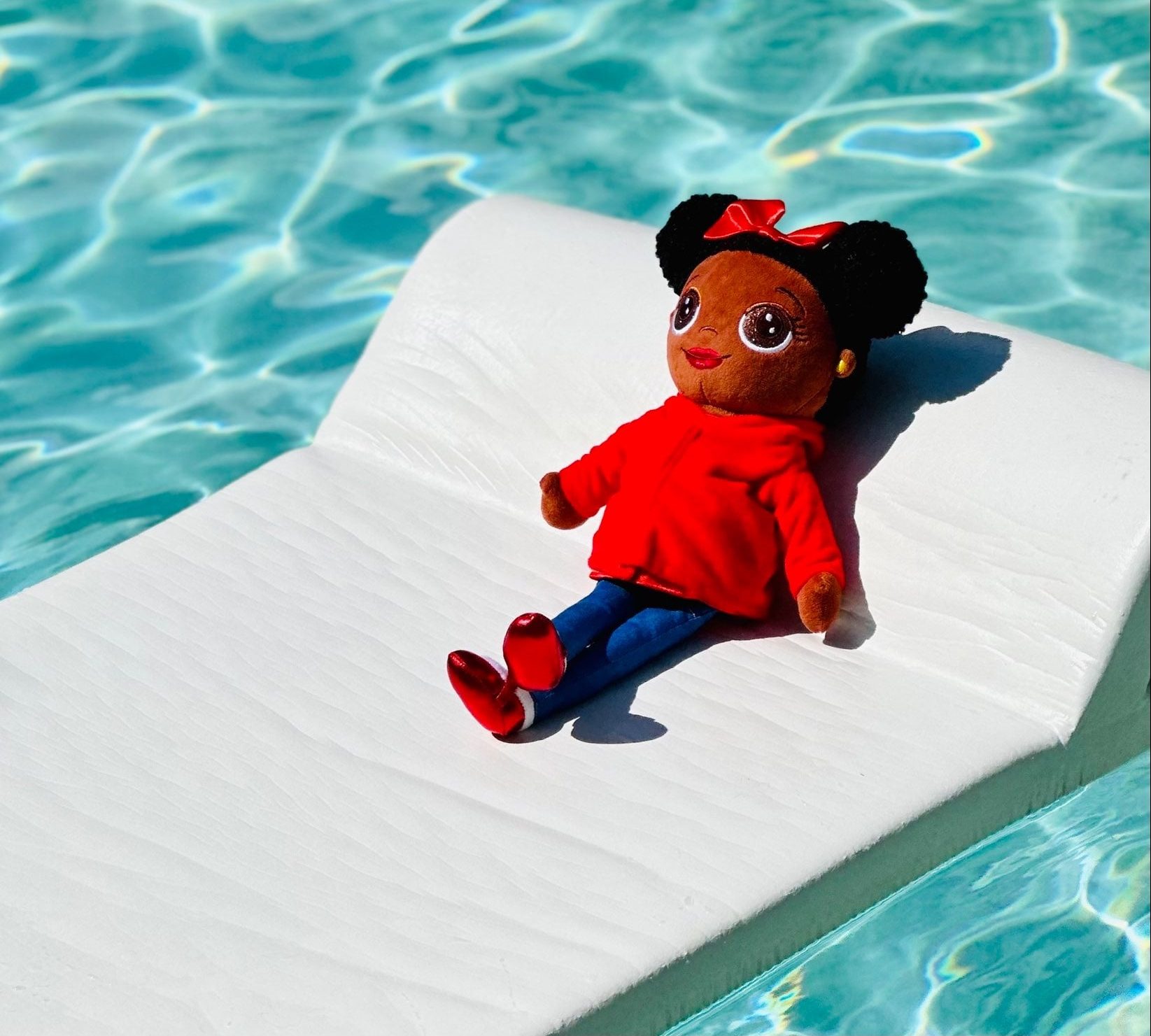Just like books and movies, toys contribute to how children understand themselves and others around them. Toys are powerful tools for teaching children about the diversity of people in the world and the importance of treating everyone with fairness and respect. Toys help kids understand the world around them. Having diverse toys in their collection helps children to develop a more inclusive worldview and fosters empathy and understanding towards others.
For instance, imagine a child of African descent playing with a doll that looks like them, with similar facial features, hair, and cultural attire. Seeing themselves represented in their toys helps them feel accepted and valued, boosting their self-esteem and confidence. On the other hand, a child of European descent playing with a black doll can learn about and appreciate the diversity of people around them. Moreover, the child would also gain exposure to perspectives, traditions, and experiences that may be different from their own.
Reason for Buying Black Dolls for Your Little Girls
Let’s discuss the role of black dolls in the upbringing of a mentally sound personality. Below are some reasons why playing with black dolls matters in children of all races’ development.
1. Representation
Children need to see toys that represent people of all races and backgrounds. Black dolls for little girls provide representation and validation for children of African descent. Imagine a young black girl walking into a toy store and seeing a doll that looks like her, with the same skin tone, hair texture, and facial features. This doll represents her, reflecting her own identity and heritage. When she sees herself represented in her toys, it fills her with a sense of pride and belonging. This representation in toys helps to build her confidence and self-esteem, as she sees that her identity is valued and reflected in the world around her.
Black dolls offer positive representation by showing children that black people are beautiful, smart, and capable, just like everyone else. For example, when children play with black dolls, they can imagine them as doctors, teachers, or superheroes, just like they can with dolls of other races. This helps break stereotypes and encourages children to see people of all races as equals.
2. Inclusiveness
As a crucial aspect of a child’s growth and development, inclusiveness raises empathy, understanding, and respect for others. It involves recognizing and valuing the diversity of individuals, including differences in race, cultural norms, and skin color. In childhood development, inclusiveness fosters empathy, understanding, and respect for others.
Black dolls serve as important tools for promoting inclusivity and diversity among children. When children play with black dolls that reflect various skin tones and racial backgrounds, they are exposed to the richness and beauty of diversity from a young age. This exposure helps children understand that diversity is a natural part of the world around them.
Through play with black dolls, little girls learn that people come in different colors, just like the dolls they play with. By incorporating black dolls into playtime, caregivers and educators can help instill important values of inclusivity and respect in children from a young age
For instance, when children play with dolls of different skin tones, they learn to appreciate diversity and develop friendships across racial boundaries. Inclusive playtime promotes a sense of belonging and acceptance, laying the foundation for a more inclusive society.
3. Celebration
For little girls, black dolls provide an opportunity to celebrate the beauty and rich heritage of the black community. For example, black dolls may have various hair textures, facial features, and clothing styles that reflect the diversity of black culture. By playing with these dolls, children learn to appreciate and celebrate the uniqueness and beauty of black individuals. Children can explore the traditions, customs, and experiences of individuals from various racial and ethnic backgrounds through imaginative play with black dolls.
Moreover, children can engage in imaginative and creative play, exploring different styles and looks while interacting with their black dolls. For instance, a child may express enjoyment in styling the hair of their black dolls or dressing them up in vibrant outfits. By engaging with black dolls, children can celebrate diversity with enthusiasm and joy, fostering a sense of appreciation and understanding for different cultures and backgrounds from a young age.
4. Friendship
Children often form strong emotional bonds with their dolls. They see their dolls as friends and companions, sharing their secrets and adventures. For example, a child may confide in their doll, share their worries, or even comfort them when they’re feeling sad.
Playing with dolls, including black dolls, can have long-term effects on children’s social skills. For example, children who engage in imaginative play with dolls learn important social skills such as empathy, communication, and problem-solving. These social skills developed through doll play extend beyond childhood and into adulthood. As children grow older, they carry these skills, helping them navigate social interactions and relationships with peers, family members, and colleagues.
5. Diversity
Introducing children to diverse toys, like black dolls, has many benefits. It helps children learn about different cultures, traditions, and people from a young age. For example, playing with black dolls allows children to explore and appreciate diversity in skin color, hair texture, and clothing styles.
There are many ways to incorporate diverse dolls, such as black dolls, into children’s playtime. For example, parents or educators can intentionally choose diverse dolls when buying toys for children. They can also encourage children to play with dolls of different races and backgrounds during playdates or in school settings. By actively including diverse dolls in children’s playtime, we can help them learn about and celebrate the diversity of the world around them.
6. Empowerment
By playing with black dolls, children learn to appreciate their own identities and the diversity of the world around them. When black children see dolls that look like them, they feel seen and represented, which boosts their self-esteem and confidence.
Additionally, black dolls challenge stereotypes by showcasing black individuals in a variety of roles and professions. For example, black dolls may represent doctors, scientists, athletes, and other positive role models, challenging stereotypes about what black people can achieve.
Black dolls for little girls also provide opportunities promoting empowerment, pride, and positive social interactions, like empathy, and inclusivity, among children of all races. For example, when white children play with black dolls, they learn to appreciate and respect diversity, which helps break down racial barriers and foster friendships with children of different races.
7. Awareness
During playtime, caregivers can introduce dolls of different races and ethnicities to prompt discussions about diversity. For instance, a caregiver might ask a child why they chose a particular doll and encourage them to explore the similarities and differences between themselves and the doll. This opens the door for conversations about race and the importance of treating everyone with respect and kindness.
Parents can also engage children in role-play activities where dolls of different races encounter tough situations. For example, children could act out scenarios where a doll is excluded from a game because of their race, prompting discussions about fairness, empathy, and standing up against discrimination.
8. Education
While black dolls for little girls can be used to educate children about social justice issues, such as racial inequality and discrimination, playing with black dolls also exposes children to different cultures and traditions, developing a deeper understanding and appreciation of diversity.
Playing with black dolls provides opportunities for children to develop social-emotional skills such as self-care, self-awareness, compassion, and empathy. Through imaginative play with black dolls, children can explore different emotions, practice problem-solving, and learn to express themselves healthily. Children may engage in activities such as styling the doll’s hair, reading stories to their dolls, or role-playing everyday routines, which promote practical life skills and encourage independence.
Meet Tyriqa: Theodora’s Black Doll for Your Little Girl
Meet our exclusive Tyriqa doll; a Black American technologist who promotes diversity and inclusion in the world of dolls and STEAM fields. At Theodora, we understand the importance of inclusivity in children’s play. Tyriqa’s character empowers girls of color to see themselves represented in STEAM role models, encouraging them to pursue careers in technology and breaking down barriers in the field.
By showcasing diverse characters like Tyriqa, Theodora’s STEAM doll contributes to fostering a sense of empowerment and belonging among children, encouraging them to embrace their identities and pursue their passions.
Final Thoughts
Dolls are the best tool to educate young minds. By integrating diverse dolls into playtime and educational activities, parents can nurture important social-emotional skills and instill values of empathy, compassion, and inclusivity from an early age. Black dolls serve as powerful tools in nurturing friendships across racial boundaries and promoting a celebration of diverse cultures. Black dolls for little girls also challenge stereotypes and promote positive narratives about black identity. They celebrate the beauty and diversity within the black community, teaching children to appreciate and respect differences.




